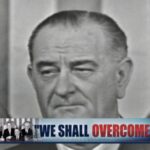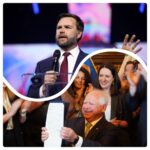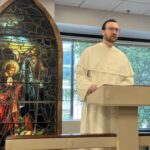GENEVA—On the opening day of the World Council of Churches Central Committee meeting in Geneva, one of the more distinct voices was one that renewal-minded Christians would applaud. From a stream of the church nearly unknown to most Americans, clarity flowed.
Bishop Hilarion Alfeyev, the Russian Orthodox Bishop of Vienna and Austria, planted himself first in line at a microphone during a Wednesday-afternoon session allowing delegates to ask questions of Moderator Walter Altmann. Bishop Hilarion wasn’t asking questions, however. Instead, he delivered a bold statement that he certainly knew would not tickle all ears in the room.
Orthodox Bishop Hilarion Alfeyev warned those gathered at the WCC Central Committee meeting of the dangers of liberal Christianity. (Photo © WCC / Peter Williams) |
“I would like to draw your attention to the danger of liberal Christianity,” he began. “The liberalization of moral standards, initiated by some Protestant and Anglican communities several decades ago and developing with ever-increasing speed, has now brought us to a situation where we can no longer preach one and the same code of moral conduct. We can no longer speak about Christian morality, because moral standards promoted by ‘traditional’ and ‘liberal’ Christians are markedly different, and the abyss between these two wings of contemporary Christianity is rapidly growing.”
The room grew quiet, and many eyes were no longer looking directly at Bishop Hilarion. People understood what he was saying. They knew well the elephant in the room. But, unlike Bishop Hilarion, most declined to actually talk about it, and obviously many disagreed with his calling their theology a danger.
Hot Buttons
Bishop Hilarion brought up homosexuality: “We are being told by some allegedly Christian leaders, who still bear the titles of Reverends and Most Reverends, that marriage between a woman and a man is no longer the only option for creating a Christian family, that there are other patterns, and that the church must be ‘inclusive’ enough to recognize alternative lifestyles and give them official and solemn blessing.”
He didn’t shy away from naming abortion: “We are being told that human life is no longer an unquestionable value, that it can be summarily aborted in the womb … and that Christian ‘traditionalists’ should reconsider their standpoints in order to be in tune with modern developments. We are being told that abortion is acceptable … and that the church must accommodate all these ‘values’ in the name of human rights.”
Bishop Hilarion did finally ask a question—several of them. However, his questions were logically rhetorical. “What, then, is left of Christianity? In the confusing and disoriented world in which we live, where is the prophetic voice of Christians? What can we offer, or can we offer anything at all to the secular world, apart from what the secular world will offer to itself as a value system on which society should be built? Do we have our own value system which we should preach, or should we simply applaud every novelty in public morality which becomes fashionable in the secular society?”
As he stood at the mike—a picture of cultural otherness in his distinctive black Russian Orthodox cassock—the bishop was telling it like it is! His message was the message of Protestant renewal groups, the message of Scripture, of the Apostle Paul. One could almost imagine a “Preach it, brother!” ringing out from the evangelical amen corner.
Bishop Hilarion is only 42 but looks even younger. Yet he is already a noted scholar, an author, and a musician and composer. He has been a bishop since age 35 and is a protégé of Metropolitan Kirill of the Moscow Patriarchate. He is also a champion of orthodoxy—both the capital-O and the lowercase-o variety. “When are we going to stop making Christianity politically correct and all-inclusive?” he asked. “Why do we insist on accommodating every possible alternative to the centuries-old Christian tradition? Where is the limit, or is there no limit at all?”
He placed the responsibility squarely on the shoulders of his fellow Central Committee delegates. “Many Christians worldwide look to Christian leaders in the hope that they will defend Christianity against the challenges that it faces…. Our holy mission is to preach what Christ preached, to teach what the apostles taught, and to propagate what the holy Fathers propagated.”
So what does the future hold? “I am convinced that liberal Christianity will not survive for a long time,” predicted Bishop Hilarion. “A politically correct Christianity will die.” And what about conservativeChristians? “[T]raditional Christians,” he believes, “will consolidate their forces in order to protect the faith and moral teaching which the Lord gave, the Apostles preached, and the Fathers preserved.”
May it be so! And God bless our Russian friend from Vienna.
No comments yet




Leave a Reply